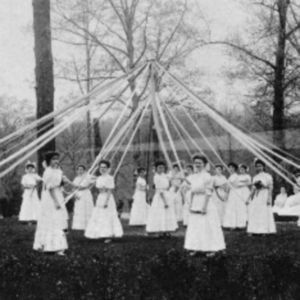Vintage Views: Lydia Crane and her longevity

The long life of Lydia Crane almost touched three centuries. Library of Congress
| Published: 03-30-2024 11:00 AM |
There was a time when patriotism flowed in the veins of every man, woman and child living in our young nation. The United States of American had defeated the British and bestowed the honor the presidency upon the man that they loved greatly, for he was their leader and he never doubted the ability of his people being loyal and dedicated to the cause. The people wanted to make George Washington the King of America in the first years after their victory over England, but the great thinkers of the time prevailed with support from George Washington and he was inaugurated president of the United States.
He served our country as the first president from 1789 until 1797 with John Adams serving as his vice president. The men that pledged to our flag were legendary, but they were aging too and in time perished. While Washington served as president in 1795, New Hampshire lost Josiah Bartlett, the New Hampshire signatory of the Declaration of Independence.
While the great statesmen guided our country in the years after the Revolutionary War, our nation was born and growing. The settlers continued to settle and the people established strong foundations not only for the new country but for their families too. The population grew and people desired to be a part of this young nation where they could feel safe and secure from tyranny.
In the north woods of Vermont, a child was born on Dec. 8, 1795. Her name was Lydia Crane, and her parents were indeed patriotic. They lived a simple life in colonial America and worked hard. The pleasures were few, and the more children a family raised the more hands were available to work on the farm and complete chores. Young Lydia certainly experienced the pain and sorrow of colonial life and understood that the constant tolling of the local church bells in Newbury, Vt., meant that people did indeed die, for nobody lives forever. The life expectancy for a child born in the days of the American Revolution was 36 years. Many ailments shortened life, especially war.
Lydia learned the basic elements of survival from her mother and enjoyed a strong family during her early years. Cooking, sewing and farming were common and appreciated skills to obtain if you wanted to live a long life into your 30s. With an abundance of colonial skills young Lydia eventually attracted the interest of a gentleman in Newbury, Vt. His name was Jonathan Tenney, and he loved his country as well as this young lady named Lydia. It was at the age of 21 that Jonathan proposed to Lydia, and she accepted. They married in November 1816 and moved to a larger town in Corinth, Vt., where they started a family as they ventured toward love and success in the future.
The first year young Jonathan and Lydia were married, the crops did not do well and there was frost every month. The corn did not mature and resulted in the loss of Indian meal. The Tenney family was forced to consume English grains such as wheat and barley to survive; yes there were lean years for the young family with difficulties laying that strong foundation. Eventually, Jonathan and Lydia settled and prospered both with their children and finances. They were stable and ready to seek opportunities over the border in New Hampshire. They loaded the children as well as their belongings onto their covered wagon and directed their horses toward a new place called Concord.
Lydia was aging well and approaching older age with a vigor, a positive woman with a good attitude toward life she lived well. They settled on Long Pond Road in District 4 on a hill out behind the Kilburn-Abbott place. The children grew and started families of their own while poor Jonathan eventually died, but Lydia soldiered on year after year, enjoying her children and her grandchildren in Concord. She continued to garden with little concerns for her health.
The 1840s arrived, and there was tension in Concord as abolitionists spoke of the meaning of human life and the rights of freedom. Many inventions appeared and intrigued Lydia. Inventions such as something called a typewriter, which was invented a few years back in 1829. A gentleman named Edgar Allan Poe won one $100 for publishing a short story called “Gold Bug” in the dollar newspaper. Yes, these were exciting times and progress was everywhere, so different from the colonial days when Lydia was born on the farm in Vermont.
Article continues after...
Yesterday's Most Read Articles
 Hometown Heroes: Couple’s sunflower fields in Concord reconnects the community to farming
Hometown Heroes: Couple’s sunflower fields in Concord reconnects the community to farming
 Boscawen resident takes issue with proposed town flag designs
Boscawen resident takes issue with proposed town flag designs
 Skepticism turns to enthusiasm: Concord Police welcome new social worker
Skepticism turns to enthusiasm: Concord Police welcome new social worker
 With new plan for multi-language learners, Concord School District shifts support for New American students
With new plan for multi-language learners, Concord School District shifts support for New American students
 With Concord down to one movie theater, is there a future to cinema-going?
With Concord down to one movie theater, is there a future to cinema-going?
 Opinion: The Concord School Board can restore trust with residents
Opinion: The Concord School Board can restore trust with residents
The 1850s arrived and they were quickly followed by the 1860s. War was known by the people of Concord and sadness a constant companion. The war effort was supported by the people in the Concord community and the troops were provided for with the limited resources. The woman would knit and sew blankets, uniforms, hats and mittens to keep their boys warm on the battlefield. Lydia admired President Abraham Lincoln just as she admired President George Washington in her early years. The people cared, consideration and support was everywhere down on Main Street and Lydia felt that patriotism swell once again. The war ended and some of the people saw the loved ones they had sent into war return again. Sadly, others families would never see their soldiers for they had perished during the war.
As the 1870s approached people were becoming curious about Lydia Tenney. They wondered about her secrets, how she aged so well. With a life expectancy of 36 years, they witnessed a healthy Lydia at the age of 75 walking the streets of Concord. She was living with her son in Concord at this time and continued to live a simple life of respect and love. The years would pass, and Lydia continued to do very well for herself. Sadly, she did lose her children as they grew to old age and she remained with her only surviving son on his farm in West Concord.
The end of the 19th century still found Lydia living in Concord. She had almost entered her third century for she was born in 1795, survived the entire century during the 1800s and was now nearing the 1900s. She was recognized, respected and honored for her age. With age comes wisdom, and our ancestors knew that they should respect their elders.
It was 103 years after Lydia Crane was born on that tiny farm in northern Vermont that she took her last breath. She died peacefully at the home she shared with her son, on a hill in West Concord. She died on Dec. 18, 1898, just shy of the next century.
A simple colonial child born and raised by a young nation. The years were indeed kind to Lydia after all.


 Concord Chorale presents ‘The Armed Man: A Mass for Peace’ by Karl Jenkins
Concord Chorale presents ‘The Armed Man: A Mass for Peace’ by Karl Jenkins Vintage Views: Our beloved May Day with dancing, horn blowing
Vintage Views: Our beloved May Day with dancing, horn blowing Homeyer: Tips for planning a successful garden
Homeyer: Tips for planning a successful garden From the farm: The Cow Spa is open
From the farm: The Cow Spa is open
